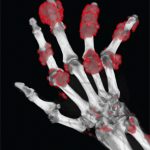Many patients on the reservation must wait longer than six months and travel more than a hundred miles to see a specialist, and many are managed by primary care providers instead. Yet previous research has shown that many primary care providers feel uncomfortable managing rheumatoid arthritis with disease-modifying anti-rheumatic drugs, and patients getting care from such providers are less likely to receive appropriate therapy.10
This disparity is worsened by the fact that the prevalence of rheumatoid arthritis in the Navajo population is about five times the national prevalence, in line with other studies that have shown an increased prevalence in different American Indian tribes. This increased incidence may be due to higher frequency of certain HLA alleles and/or other unknown genetic and environmental factors. American Indian rheumatoid arthritis patients also often present with early onset disease, and they tend to have more severe disease features.11
RAE Initiative Design
After talking to Navajo community members and doing a structured needs assessment, Dr. Mandal and colleagues opted to implement one-hour weekly training sessions to teach primary care providers about the diagnosis and management of rheumatoid arthritis. Over 12 weeks, the researchers deployed live, interactive, didactic and case-based training, using a well-established educational model based on Project ECHO (Extension for Community Healthcare Outcomes), first developed at the University of New Mexico to expand primary care provider education on hepatitis C.12
Explained Dr. Mandal, “[The model] allows a small group of specialists to train primary care providers remotely using a series of live, interactive webinars. Then these primary care providers are equipped with the skills and knowledge they need to provide better specialized care to their patients.”
Dr. Mandal noted that the RAE’s inclusion of Navajo cultural interpreters in both the teaching and curriculum development process was critical. For example, the researchers learned that about one in four homes on the Navajo reservation lack electricity, making it difficult to refrigerate a biologic drug. Moreover, regular laboratory monitoring—for a drug like methotrexate, for example—is challenging for some patients, especially during winter months when the roads may be impassable.
“These are very important considerations for [primary care providers] to take into account when they consider what medications are best for their patients with rheumatoid arthritis,” said Dr. Mandal.
To date, 30 primary care providers have completed the course. When assessed via a Likert scale of 1 (not at all useful) to 5 (extremely useful), the mean usefulness rating across all sessions was 4.62. Moreover, physicians’ self-reported confidence in treating rheumatoid arthritis improved after the sessions, as did their performance on knowledge assessments on the diagnosis and management of rheumatoid arthritis.



